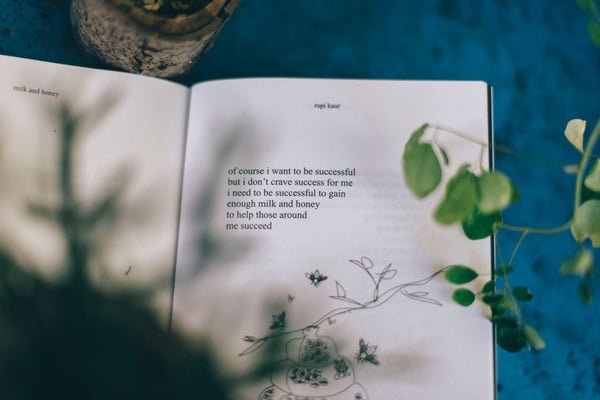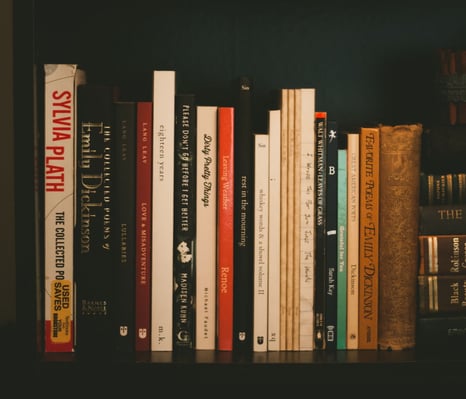For most readers, poetry is the genre of literature that holds an air of mystery over us. Poems...
by Lisa Hiton

Whether you sit down at a family Seder each year to retell the story of the Jews leaving Egypt, listen to your grandparents’ tales from the “old days”, or just can’t wait for a new episode of The Moth to download, we all love a good story. Our love of reading good stories and our desire to write good stories comes from our early encounters hearing them.
Poetry too, comes from this oral tradition. While once, orating was necessary as a means for humans to communicate and pass on all kinds of information and modes of expression, poetry’s roots in recitation still remain at the forefront of the art today.
In this month’s Write Place, we’ll take a look at several poetry communities who share the love of storytelling and the spoken word.
America's Favorite Poem Project
America’s Favorite Poem Project was begun by (and still run by) Robert Pinsky (Robert Pinksy was also our Guest Judge for our Poetry and Spoken Word competition!). The project is a growing archive of videos that show and celebrate Americans reciting their favorite poems. Pinsky founded the project in 1997 while he was the US Poet Laureate. The project now includes a video archive, multiple anthologies, and a summer institute with resources on poetry for K-12 educators.
According to Pinsky, “poetry is a vocal art, an art meant to be read aloud. If a poem is written well, it is written with a poet’s voice and for a voice,’ he says. ‘Reading a poem silently instead of saying a poem is like the difference between staring at sheet music or actually humming or playing the music on an instrument.’” The project’s first year of open submissions yielded over 18,000 entries. Memorizing poems is a tradition as old as Homer’s The Odyssey. Participating in this practice can help us better understand how and why poem’s work, which can help us when we write our own.
- Browse through the FPP archives. What videos are you drawn to? What do you notice about the speaker of the poem? What sticks with you from the poem itself?
- Find a poem you want to commit to memory and memorize. Try to choose a poem that’s at least 14 lines (this will mark a sonnet). What lines are easy to keep in mind? Where do you tend to forget part of the poem?
- Try to heed Pinsky’s advice—think of this reading as a way to bring sheet music to life. Use the line breaks as rests. Use punctuation to help you keep the “tune” of the poem ripe for your version of speaking it aloud.
- Memorize or read the poem in an FPP style recitation. You can do this by hosting a gathering of other FPP fans and participants at your school, library, or within your family. You might also make your own FPP style video.

Louder Than a Bomb
Louder Than a Bomb—or LTAB—is an organization in which students write their own poems and recite them at a slam poetry competition. LTAB started in Chicago in 2001, just after 9/11. Like many poetry movements, LTAB arose as a community need in Chicago. After the Twin Towers fell, “young people of color in Chicago were being targeted by an anti-gang loitering law, which took away their right to assemble in groups of more than two.” The founders of LTAB sought to create a space where young people could be together and express themselves despite the violence and fear they faced in their day to day lives. Now, LTAB is the largest youth poetry slam in the world. Using LTAB’s model can help us all learn to write better. It can also teach us how to be heard. And perhaps most importantly, it can help us learn to listen to others.
- Writing poems as a community. You can do this by getting a group of people together at your school, library, or in your family. You might even start by watching Louder than a Bomb, a documentary about the organization, as inspiration for where to start in your writing and reciting process as a group.
- Using the LTAB prompts/methods as outlined on the LTAB website, begin trying your hand at writing poems. As you work with your group, practice memorizing and reciting your works to each other.
- Use these methods to take parts of your life and turn them into a song/rap/spoken word poems.

Poetry Out Loud
Poetry Out Loud is a poetry recitation contest that began in 2006 to encourage student engagement with poetry. The contest is currently run in the U.S. The nationwide contest begins in individual classrooms. Students advance to schoolwide levels, then statewide, and eventually, the contest ends with finalists competing in Washington, D.C. Even if you aren’t in the U.S., Poetry Out Loud has materials to help you start committing poems to memory and working with recitation.
Poetry Out Loud has all kinds of resources available on their website. Students are to select poems from their official list of works to memorize. As you find your own poems to memorize, you’ll begin to see how lines work, how rhymes and meters begin to take that seemingly strange thing we call a poem and make it into something more like a song. You can even host your own Poetry Out Loud contest amongst friends or across your school.
- Students can find poems to memorize from Poetry Out Loud’s official list. The curation of poems brings in works from various writers and time periods. In hosting your own version of POL, you might even have different rounds of the competition in which participants memorize from distinct time periods. For example, for most of us, it would be harder to work with a poem from, say, the 16th century as English has evolved so much since then.
- Find a panel of judges for your contest. You can reach out to teachers, local writers, librarians, or family members. You can use POL’s materials for judging recitation or create your own rules.
In the case of each of these organizations, loving poetry is at the forefront of their missions. Poetry is the central element that creates these communities. It brings people together to perform, sure, but more importantly to listen. We all have a voice. We all have the power to express. And we all have the power to be heard by each other. And despite the elements of competition in some of these organizations, the skills you will learn from reciting poetry—your own or the poems of others—go beyond literature. You’ll learn how to speak in front of others with confidence. You’ll practice your public speaking skills. Your knowledge about literary history and its place in communities will grow. You’ll learn how to listen to others. And you’ll learn how to speak for yourself. You’ll learn how all of these voices can belong in one community.
About Lisa
Lisa Hiton is an editorial associate at Write the World. She writes two series on our blog: The Write Place where she comments on life as a writer, and Reading like a Writer where she recommends books about writing in different genres. She’s also the interviews editor of Cosmonauts Avenue and the poetry editor of the Adroit Journal.





